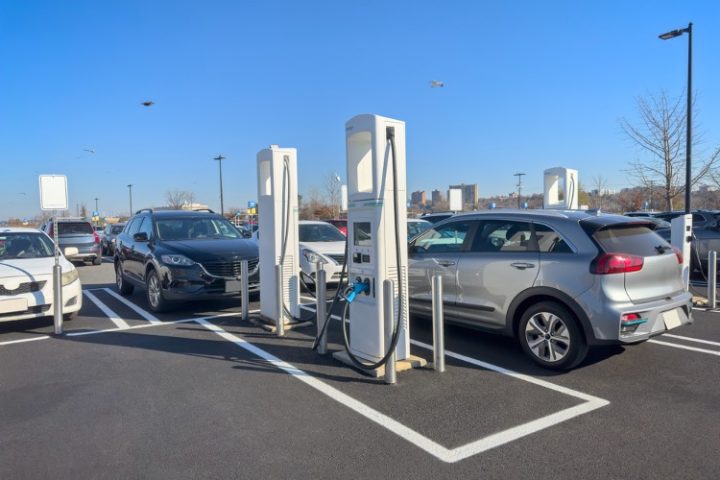
First there was the claim that because of the tremendous amount of CO2 released during an electric vehicle’s (EV’s) production, you’d have to drive one hundreds of thousands of miles to reach CO2-emissions parity with a gas-powered car. Next came an assertion from a think tank that an EV costs “approximately $48,698 more to own over a 10-year period.” Now there’s another apparent blow to the EV dream:
The true cost of charging such a vehicle, factoring in hidden expenses, is the equivalent of $17.33-per-gallon gasoline, reports the aforementioned think tank, the Texas Public Policy Foundation (TPPF).
There’s a kicker here, too: Since much of this cost is covered by government subsidies, it means that middle-class and other taxpayers are subsidizing wealthy EV owners.
These realities and more are revealed in the TPPF’s paper “Overcharged Expectations: Unmasking the True Costs of Electric Vehicles.” The New York Post reports on some of the findings:
$22 billion in government handouts to EV owners and manufacturers absorb the extra expense at every stage of the vehicle’s life, from raw-material sourcing to battery charging.
Examining the numbers behind recharging makes this very clear.
While EV advocates claim charging costs are equivalent to $1.21-per-gallon gasoline, the real amount is an order of magnitude more.
Including the charging equipment, subsidies from governments and utilities and other frequently excluded expenses, the true cost of charging an EV is equivalent to $17.33-per-gallon gasoline — but the EV owner pays less than 7% of that.
Over 10 years, almost $12,000 of costs per EV are transferred to utility ratepayers and taxpayers, effectively socializing the price of recharging an EV while keeping the benefits private.
Due to high entry price points — the average EV costs $58,000, the average gas vehicle $33,000 — most EV consumers are affluent.
This is socialism for the rich: a transfer of costs from higher net-worth individuals to middle- and lower-income taxpayers.
It’s the equivalent of levying taxes and fees on public-transportation users and those who walk or bicycle to work and using the money to reduce the price of gasoline.
To add further perspective, the TPPF writes that the $17.33 estimate does not “include the hundreds of billions more in subsidies in the Inflation Reduction Act (2022) for various aspects of the EV supply chain, particularly for battery manufacturing. It is not an overstatement to say that the federal government is subsidizing EVs to a greater degree than even wind and solar electricity generation and embarking on an unprecedented endeavor to remake the entire American auto industry.”
Again, it should be emphasized that generally rich EV owners pay only seven percent of the cost of running what is often a greentopian value-signaling project. That means that almost all the cost is borne by John Q. Doormat.
He’s on the hook right off the bat, too. As The Boston Globe informs, “For years now, the federal government has offered consumers a $7,500 incentive for the purchase of an EV.”
All this said, “Environmentalist critics are likely to doubt the integrity of the study’s findings, as the TPPF has received contributions from Exxon and Chevron,” notes the Washington Examiner. Alright. Yet also noteworthy is that the TPPF appears supportive of emissions-reducing technology.
“Federal policy is also pushing EVs over hybrid vehicles, even though hybrids offer a far more efficient way to improve fuel economy and reduce emissions,” the think tank’s report also reads. “They use a much smaller battery, offer excellent driving range and performance, and don’t require any upgrades to our electric infrastructure. Toyota estimated that 90 hybrid batteries can be made from the same amount of raw materials as one EV battery and that those hybrids will reduce emissions 37 times more over their lifetime than one EV (McParland, 2023). However, hybrids receive far fewer subsidies and regulatory favors than EVs, as the prevailing political consensus is ‘all EV or nothing.'”
(Hat tip: the Washington Examiner.)
Making this all the more foolhardy is that, according to ex-electric car engineer and plug-in advocate Ozzie Zehner (and others), EVs aren’t even environmentally friendly. In fact, Zehner contends in his book Green Illusions and his 2013 essay “Unclean at Any Speed,” they pollute more than gas-powered cars do.
Thus is the TPPF report’s conclusion, which expresses some common-sense counsel, especially salient. “The lesson to be learned from this study is that markets, not government, drive innovation and efficiency,” the think tank writes. “Despite the massive financial and regulatory advantages being offered to EVs, there are more than four times more hybrid and plug-in hybrid vehicles than full EVs registered in the U.S. (EERE, n.d.-b)…. Perhaps if D.C. politicians and bureaucrats stop trying to force Americans to build and buy their preferred types of vehicles, the cleaner and brighter future that they imagine will actually materialize.”
These are words to the wise. Note here that the vehicle widely reputed to be “the worst car ever made,” the Yugo, was produced in socialist Yugoslavia by a state-owned company. It really does seem that, as a general rule, the quality of something is inversely proportional to the degree of government involvement in its creation.



